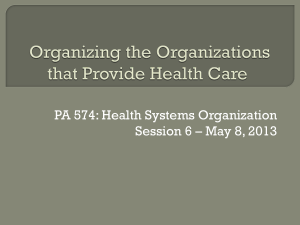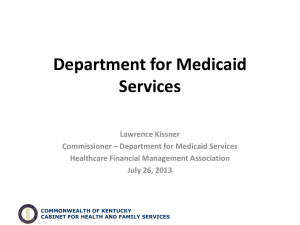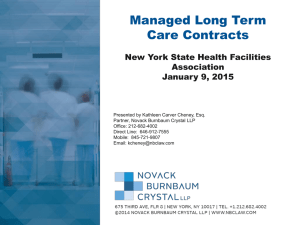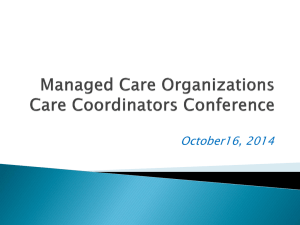The Emergency Room Conundrum and Other MCO Payment Games
advertisement
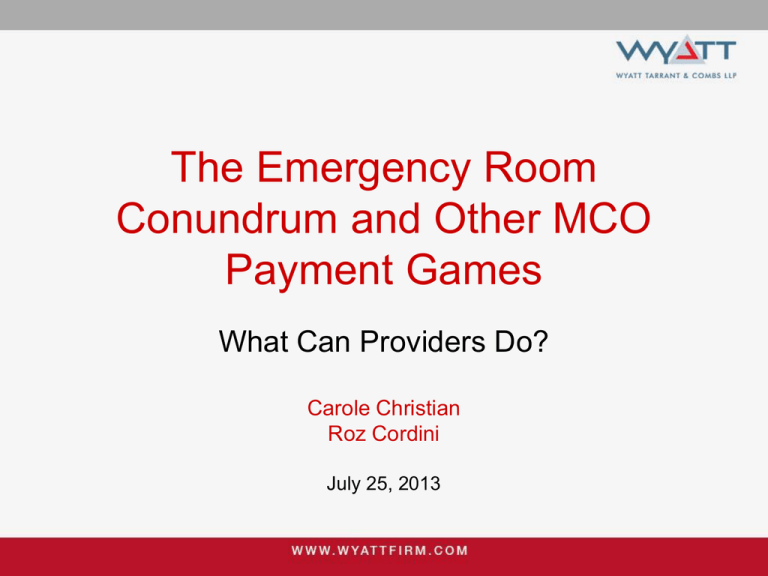
The Emergency Room Conundrum and Other MCO Payment Games What Can Providers Do? Carole Christian Roz Cordini July 25, 2013 Medicaid Managed Care Ky. November, 2011 550,000 Medicaid patients were transitioned from a feefor-service model with a primary care case management component to “risk-based” managed care Medicaid Managed Care Ky. Region 3 Has operated under a separate CMS waiver as a riskbased managed care arrangement since 1995 (Passport Health Plan) Waiver expired 12/31/12 Implementation Timeline CMS Approval 9/8/12 Bids Due Assignment to Plans Initially, Kentucky Spirit had the highest assignment due to its lower overall capitation rates As of July 9, 2012, following the switching period, Coventry saw the highest CMS enrollment Approval 9/8/12 Bids Due Incentives were offered by Plans to entice enrollment Initially, Coventry didn’t charge co-pays Provider Networks As of June, 2012, 73% of the state’s hospitals had contracted with all three Plans; 25% of the state’s hospitals had contracted with two Plans; and 2% of the state’s hospitals had contracted with just one Plan CMS Approval 9/8/12 Few PCPs and fewer specialists have contracted with all three Plans, creating access issues Bids Due Capitation Rates Kentucky’s Department of Medicaid Services pays each Plan a per-member-per-month capitation rate The MCOs then pay providers negotiated rates CMS Approval 9/8/12 Rates paid to MCOs were established by each Plan developing its own rate based upon experience in other states; Bids Due Price Waterhouse Cooper independently offering a range of rates they believed adequate to meet the managed care goals of the state; each Plan’s negotiations with the state Capitation Rates Region 1 (Initial) CMS Approval 9/8/12 Bids Due Capitation Rates Did the Plans underbid their contracts with the state? short-term losses leading to long-term gains with the expanded Medicaid provisions of the ACA? receipt of incomplete state data? rates determined before CMS contracting with providers was Approval 9/8/12 completed? MLRs in the first Bids2 quarters following implementation: Due Capitation Rates Initial contracts called for risk-adjustment State implemented risk-adjustment on 4/15/12 resulting in increased rates for Coventry and WellCare and a decrease in rates for Kentucky Spirit CMS Approval 9/8/12 January 2013 – State gave Wellcare and Coventry a 7% rate increase in exchange for a release of claims Bids Due MCO Dashboard 11/1/11 – 10/31/12 (From State records) Coventry Membership $2,867,553 $1,891,417 $962,343,013 $593,782,404 $335.60 $313.94 $867,293,367 $260,811,280 Suspended Claims Bids58 Report Due % Suspended $1,528,001,683 $294,583,431 63.79% 53.04% Paid per Member $302.45 $137.89 Paid Loss Ratio 90.12% 43.92% Capitation Capitation per Member Standard Measure CMS Approval 9/8/12Threshold Paid Claims Report 58 Claims Payment KY Spirit Report 60 90% paid in 30 Days 99.6% 98.1% Report 60 99% Paid in 90 Days 100% 99% MCO Dashboard 11/1/11 – 10/31/12 (From State records) Coventry Standard Measure Threshold Requested PIAs Report No Rx Denied 231,652 242,532 18,868 4,765 8.14% 1.96% MCO Paid Amount $23,545,794 $960,813 COB Amount $89,957,189 $10,492,548 COB/Member $31.37 $5.55 % of Claims Paid 10.37% 4.02% $21,844,775 $3,390,966 CMS Approval 9/8/12 % Denied Bids Due COB Cost Savings Report Medicaid Cost Avoidance KY Spirit Denied Amount Ky MCO Laws 907 KAR 17:005 – 17:030 as of 5/14/13 Emergency Care Post-stabilization services Urgent Care Enrollee Non-liability for Payment Utilization Management Prior Authorization Medically Necessary Prompt Payment of Claims Grievance Procedures Emergency Care 42 U.S.C. 1396u-2(b)(2)(B) Emergency services care is assured each state contract with an MCO must assure that coverage is provided for emergency services without regard to prior authorization or the emergency care provider’s contractual relationship with the organization or manager, and to comply with federal guidelines established related to coordination of post-stabilization care section What are emergency services? covered inpatient and outpatient services furnished by a provider that is qualified to furnish such services under this subchapter, and are needed to evaluate or stabilize an emergency medical condition Emergency Care 42 U.S.C. 1396u-2(b)(2)(B) What is an emergency medical condition? A medical condition manifesting itself by acute symptoms of sufficient severity (including severe pain) such that a prudent layperson, who possesses an average knowledge of health and medicine, could reasonably expect the absence of immediate medical attention to result in— placing the health of the individual (or, with respect to a pregnant woman, the health of the woman or her unborn child) in serious jeopardy, serious impairment to bodily functions, or serious dysfunction of any bodily organ or part. Emergency Care Federal Law Where can an MCO Enrollee Receive Emergency Care? At a health care facility most suitable for the type of injury, illness or condition, whether or not the facility is in the MCO network – 907 KAR 17:015(2)(6). Whether in or out of network, emergency services is a covered service – 907 KAR 17:020(2)(5)(c). Emergency Care Provided by an Out of Network Provider MCO must cover out-of-network services Provider must accept regular Medicaid rate - 42 U.S.C. 1396u-2(b)(2)(B). Emergency Care MCOs cannot define an emergency medical condition on the basis of a list of symptoms or diagnoses MCOs cannot refuse to pay for emergency services because a provider didn’t seek authorization within 10 days following the service The treating provider determines whether a patient is stabilized and ready for either transfer or discharge MCO must accept this determination and accept responsibility for coverage and payment -42 CFR 438.114 Emergency Care Post-stabilization Services covered services related to an emergency medical condition provided to an enrollee after they are stabilized in order to maintain that stabilized condition or provided to improve or resolve the enrollee’s condition Payment for Post-stabilization Services The MCO Is financially responsible for post-stabilization care services both in and out of network even if not pre-approved if— The MCO organization does not respond to a request for pre-approval within 1 hour; The MCO organization cannot be contacted; or The MCO organization representative and the treating physician cannot reach an agreement concerning the enrollee's care and a plan physician is not available for consultation. Urgent Care Care for a condition not likely to cause death or lasting harm but for which treatment should not wait for a normally scheduled appointment – 907 KAR 17:005 Access Standard within 48 hours of request – 907 KAR 17:015 Urgently needed services means covered services that are not emergency services, provided when an enrollee is temporarily absent from the MCOs service area or, in the service or continuation area but the organization's provider network is temporarily unavailable or inaccessible (under unusual and extraordinary circumstances) and as a result of an unforeseen illness, injury, or condition; and it was not reasonable given the circumstances to obtain the services through the organization offering MCO Plan – 42 CFR 422.113 Utilization Management 907 KAR 17:025 Review, monitor and evaluate the appropriateness and medical necessity of care and services Have a written UM Plan Identify and describe mechanisms used to detect the under or over utilization of services and act after identifying under or over utilization of services Adopt nationally-recognized standards of care and written criteria Only a physician with clinical expertise in treating an enrollee’s condition or disease is authorized to deny a service in an amount, duration or scope that is less than requested by the enrollee or his physician Medically Necessary 907 KAR 3:130 Based on an individualized assessment of the recipient’s medical needs; Reasonable and required to identify, diagnose, treat, correct, cure, palliate, or prevent a disease, illness, injury, disability, or other medical condition, including pregnancy; Appropriate in terms of the service, amount, scope, and duration based on generally-accepted standards of good medical practice; Provided for medical reasons rather than primarily for the convenience of the individual, the individual's caregiver, or the health care provider, or for cosmetic reasons; Provided in the most appropriate location, with regard to generally-accepted standards of good medical practice, where the service may, for practical purposes, be safely and effectively provided; Needed, if used in reference to an emergency medical service, using the prudent layperson standard Clinically Appropriate 907 KAR 3:130 Pursuant to the nationally-recognized clinical criteria known as Interqual developed by McKesson Health Solutions Service Authorization 907 KAR 17:025 The MCO identifies what constitutes medical necessity and establishes P&P including a timeframe for making authorization decisions Must make an authorization decision as expeditiously as the enrollee’s health condition requires, and within 2 business days following a request for service Timeframe can be extended By the enrollee or their provider, or By the MCO if they justify to DMS, upon request, a need for additional information and how the extension is in the enrollee’s best interest No more than an additional 14 days Denials 907 KAR 17:025 Written notice to the enrollee (and provider) within 2 business days of the request Must include Action the MCO intends to take Reason for the action Right to file an appeal Right to request a state fair hearing Procedure for filing an appeal and requesting a state fair hearing Right to have benefits continue pending resolution of the appeal, how to request benefits be continued and the circumstance under which the enrollee may be required to pay the costs of these services Triage Payments KY Spirit May 2012 Letter to Providers Payment for ED services will be made for “claims coded with a diagnosis that represents a disease or condition that is recognized as a medical emergency” Others will receive a $50 triage fee Later Correspondence Letter? What letter? “We pay according to the ‘prudent layperson’ standard” Triage Payments Coventry Less Obvious Requires submission of documentation for ER claims with nonemergent diagnosis codes Clinical staff will review the submitted clinical support for proper ACEP E&M coding Wellcare Claims not satisfying the “prudent layperson” standard will be paid at a $50 triage rate Cabinet – “the MCOs’ policies satisfy the ‘prudent layperson’ standard” Algorithms????? Other Payment Games We Have Heard Of . . . 90% or 65% of Medicaid rates for OON providers Churning Claims paying, then recouping, then paying at a different rate multiple times Changing codes, adding modifiers and denying claims based on changed codes Denying services for lack of pre-authorization, even where obtained Denying line items of claims that have to be re-submitted due to non-payment Referral to agents or subsidiaries handling particular types of claims Claiming right to year-end settlement of outpatient costs without contract right Denying all cross-over claims, or paying as Medicaid would Adjusting velocity of payments based on MCOs public report filings This list is not exhaustive and includes only those that have been identified to date and reported to the speakers Other Concerns Reimbursement Delays Administrative barriers Late claims payment Increase in suspended claims Prior Authorization Slow, burdensome process CMS Approval 9/8/12 fax or snail mail quantity of information requested - complete records Unclear authorization criteria Same criteria, butBids applied differently or inconsistently Decisions based Due upon more information than known to the admitting provider Denials without clear indication of what criteria failed Inconsistent Coding Standards Other Concerns cont’d Interim Rates FQHC’s and RHC’s reimbursed on a prospective rate CAH’s reimbursed on a cost-basis CMS Approval 9/8/12 Rates not regularly reconciled by the state delays in reimbursement adjustments resulting in cash flow Bids problems Due State began issuing monthly checks based on estimated claims data from the previous year No plan to reconcile claims based on actual claims data Naveos Preliminary Findings $3.1M Two Hospitals, Two Payors Improper assignment of DRG values & payment Use of Medicare version 29 grouper to assign DRG, then crosswalking to version 24 with translation table, can produce different DRG Inaccurate base rate after 2012 revision Improper use of the High Volume Per Diem add-on payment Improper calculation of outlier payment Outdated CCR ratio Incorrect threshold Improper calculation for carved out charges Improper lab fee schedule when paying for hospital base lab services Use of outdated fee schedule Use of a non-hospital lab fee schedule Naveos Preliminary Findings $3.1M Two Hospitals, Two Payors Use of lower of payor-specific fee schedule or CCR for select nonlab procedures Use of lower of CCR or lab fee schedule when paying designated lab service Improper retro-eligibility denial Improper bundling of multiple procedure codes into a single, unpaid bundled code Use of payer specific fee schedules in lieu of CCR for lab procedures outside of designated range Use of improper CCR when paying outpatient claims Exclusion of procedure codes from claims payment process (missing Hospital codes from payer adjudication) What Can Providers Do? Dispute Resolution Grievance State Fair Hearing Appeal Grievances Grievance: An expression of dissatisfaction about a matter Enrollee must file a grievance within 30 days from the date of the event causing satisfaction MCO must acknowledge receipt of the grievance within 5 days and provide an expected date of resolution Investigation and resolution within 30 calendar days of the date the grievance was received by the MCO MCO Appeals Enrollee has 30 calendar days from the date of receiving a notice of adverse action from an MCO to file an appeal MCO must provide written acknowledgement of receipt of appeal within 5 working days of receipt of the appeal along with an expected date of resolution MCO must resolve the appeal within 30 calendar days from the date the initial appeal was received by the MCO MCO can extend the resolution timeframe by 14 calendar days if either the enrollee requests it, or the MCO requests it for need of additional info, and the extension is in the enrollee’s best interest MCO must continue benefits to the enrollee, if the enrollee requested continuation, until the appeal is withdrawn by the enrollee; 14 days have passed since the date of the resolution letter if the resolution was against the enrollee and no state fair hearing was requested or taken other further action; or a state fair hearing decision adverse to the enrollee was issued State Fair Hearing Only available after the enrollee exhausts the MCO’s internal appeal process Must be postmarked within 45 days from the date of the MCO adverse action letter issued at the end of the appeal process Pursuant to KRS Ch. 13B Judges are attorneys in the Administrative Hearings Branch Must have a Kentucky lawyer Medicaid Appeals Medicaid Appeals 800 700 Number of Appeals 600 500 MCO 400 FFS 300 200 100 0 2011 2012 Year Medicaid Appeals 2012 MCO Appeals 180 160 140 Number of Appeals 120 100 80 60 40 20 0 1 Type of Case IP Psych Hospital Stay EPSDT Disposable Medical Supplies Orthodontic Pharmacy Lock-in 2013 Administrative Hearings Branch Appeals Pursuant to 907 KAR 1:563 Administrative Hearings Branch MCO Appeals (1/1/13 - 5/31/13) 80 74 70 Number of Appeals 60 50 40 28 30 22 20 10 2 0 Coventry Cares Wellcare Kentucky Spirit MCO Coventry Cares Wellcare Kentucky Spirit Passport Passport Prompt Pay Remedy - Court or Administrative? Judicial Doctrine Exhaustion of Administrative Remedies Required First BUT Is there an administrative remedy? KRS 446.070 – Person injured by violation of a statute may sue for damages Insurance statute says insurer cannot require appeal where claim not paid at contract rate Amounts owing are often legal issues beyond agency expertise Judicial decision pending in ARH v. KY Spirit Prompt Payment of Claims 907 KAR 17:030 Clean claim means one that can be processed without obtaining additional information from the provider of the service or from a third party It does not include a claim from a provider who is under investigation for fraud or abuse, or a claim under review for medical necessity 90 percent of all clean claims must be paid within 30 days of the date of receipt 99 percent of all clean claims must be paid within 90 days of the date of receipt All other claims must be paid within 12 months of the date of receipt, except 42 CFR 447.45 Plus interest if late HB 5 2013 Session Made the Department of Insurance (DOI) the enforcer of the prompt pay laws related to MCOs Any provider to be able to file a complaint with the DOI What Can be Done? Wait for Governor Beshear’s Plan to complete Negotiate your contracts to address these issues File a complaint with the Department of Insurance File an appeal Collect evidence for a lawsuit Governor Beshear’s Plan Prompt pay disputes to be reviewed by Ky. Dept. of Insurance all responsibility for governmental review of provider complaints relating to prompt payment of medical claims has moved from DMS to DOI MCOs to meet with every hospital in state to reconcile accounts receivable Each of the three statewide MCOs – Wellcare, Coventry, and Kentucky Spirit – has agreed to meet individually with every hospital in Kentucky with which they contract to review and reconcile all outstanding accounts. This effort will begin immediately and continue until every hospital’s accounts receivable has been reconciled. All MCOs have also agreed to meet with any other provider upon request. Targeted audit of each statewide MCO by Ky. Dept. of Insurance the audits will seek out whether systemic changes are needed to address areas such as claim or complaint handling, prior authorization practices, or emergency medical service payments. MCOs will pay for the examinations, and reports are expected to be complete no later than August 15. Education forums on best practices/ER Improvements Face to face meetings between the DOI, providers and the MCOs File a Complaint with the DOI File a Complaint with the DOI Contract Strategies More Leverage Than You Think MCO Contracts with States Requires MCOs to pay “90%” or “no less than 90%” of Medicaid rates for OON services (Emergency – 100%) State strategy to force providers into contracts, but gives MCOs unfair leverage Worse, KY Spirit ultimately reduced OON payments to 65% in December 2012; state has not intervened March 2013 – Judge Forester ruled that the contract term between State and Coventry related to OON payment was not binding on ARH Coventry owes ARH its “reasonable value of services” quantum meruit Appalachian Regional Healthcare, et al. v. Coventry Health and Life Insurance Company, No. 5:12-CV-114-KSF, U.S. District Ct., Eastern District of Kentucky (3/28/13). What is “Reasonable Value?” TBD in a future hearing Could be Commercial rates Actual cost plus margin Actual cost Medicaid rates Something else Possible suit if you have been OON Beware Accord and Satisfaction or the remittance advice that purports to settle as payment in full Other Contract Issues Prior Authorization But authorization services only available M-F during normal business hours Consider a provision where authorization is automatic if provider does not hear back from MCO within “X” days Medical Necessity Based on whose patient assessment? consider a provision that it is based upon the treating provider’s assessment of the patient (or limited to facts known) at the time services were ordered Arbitration Do you have to exhaust internal procedures first? What is the deadline for filing for arbitration? Is it reasonable? Effect on breach of contract claims Consider a provision clarifying that any internal grievance process is in addition to any other rights provider may have under state or federal law, or the arbitration provisions in the agreement Other Contract Issues Provider Manual and Policies Agreements frequently refer to other documents, have you read them? Consider provision that states the agreement rules when there is a conflict between the two Opportunity to terminate if provider manual revised and you don’t agree Prompt Payment Does the Agreement language match state law requirements? Consider a provision allowing immediate termination if the MCO doesn’t pay clean claims in the designated timeframe Provisions for PCLs, reconciliation Rate Changes consider a provision requiring advance notice of rate changes and requirement that provider agree to rate or is permitted to immediately terminate if an agreement is not reached If contract rates tied to Medicaid, include a provision to adjust rates retroactively if you win Medicaid rate appeal Other Contract Issues Provisions Upon Termination Transition coverage of patients Provider’s right to notify patients, public Requirement for Plan to notify Members Agreement that Termination is cause for Members to move Consider timing of open enrollment so MCO can’t “bait and switch” Ongoing Disputes Kentucky Spirit’s Exit Bids Due Outstanding Amounts Owed By KY Spirit $25M Bond State has counterclaims Centene, parent corporation, is big enough to satisfy claims Possible exceptions to general rule against “piercing the corporate veil” Class Action lawsuit? Could Cabinet be held liable for a shortfall? ARH v. Coventry April 2013 Coventry notifies ARH of termination of LOA claimed Cabinet created crisis by not enforcing network adequacy rules with KY Spirit, forcing movement of high-risk Members, and errors in data book Coventry VP says it will not contract with ARH or authorize OON services “until we can get the Commonwealth to do the right thing” ARH sues Coventry and State alleging violation of state and federal laws regarding network adequacy and prompt pay laws; breach of contract; unfair trade practices and tortious interference; and bad faith ARH v. Coventry June 2012 Judge Forester enters injunction against Coventry’s termination of contract through the end of open enrollment 2013 6th Circuit Court of Appeals dismisses Coventry’s appeal Court rules for ARH on OON payment rates KDMC added as a plaintiff CMS added as a defendant on theory that it violated federal law in approving the state plan After paltry initial FOIA response, CMS has now produced 9,000 pages of documents Inpatient Medicaid Rate Disputes KRS 205.560(2) Payments for hospital care, nursing-home care, and drugs or other medical, ophthalmic, podiatric, and dental supplies shall be on bases which relate the amount of the payment to the cost of providing the services or supplies River Valley Behavioral Health v. Commonwealth of Kentucky Cabinet for Health and Family Services, et al., No. 09-CI-0797, Franklin Circuit Ct (5/30/12) DMS rate methodology in violation of KRS 205.560 where rate did not “relate” to actual costs Rates based on previous year’s allowable costs and did not take into consideration changed circumstances, resulting in an inadequate per diem rate This decision follows a similar 2004 case involving Northkey Community Care Inpatient Medicaid Rate Disputes May 31, 2013 Cabinet denied relief to 58 hospitals who had overdue dispute resolution proceedings dating back to 2007 inpatient rates Cabinet also filed a lawsuit in Fayette Circuit Court seeking declaration that it does not have to pay on bases that relate to cost All 58 hospitals united in filing an appeal from their denials in Franklin Circuit Court and motion to dismiss or transfer the Fayette case Franklin Circuit Court is wise to the Cabinet’s shenanigans advised counsel that it will follow the River Valley and Northkey cases Successful appeals could mean better MCO rates Questions? Carole Christian 502-562-7588 cchristian@wyattfirm.com Roz Cordini 502-562-7307 rcordini@wyattfirm.com

